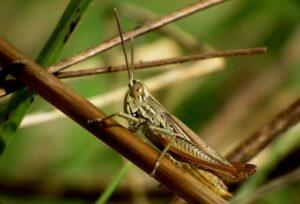Four plant protection products have received emergency authorization to control locusts
In Hungary, due to the extremely hot and dry summer weather in recent years, the mass proliferation and damage caused by various species of locusts (Moroccan, Italian, migratory locusts) has been a recurring problem year after year. For the purpose of control, the National Food Chain Safety Office (Nébih) issued an emergency authorization for the use of four plant protection products at the request of the Hungarian Chamber of Plant Protection Engineers and Phytopathologists. Two of the products used on farms can also be used in small gardens.

(Photo: Pixabay)
The locust species cause extensive problems mainly in hotter, drier Great Plain areas – such as Bács-Kiskun, Békés, Csongrád-Csanád and Szabolcs-Szatmár-Bereg counties. The insects are mobile and fly well, so they can easily spread to other regions.
In order to prevent significant damage, it is particularly important to monitor their appearance
Their feeding – which often increases to gnawing – is most sensitive in vegetable crops, but locusts generally damage both horticultural and arable plant species. To help affected farmers, the use of Karate Zeon 5 CS, Decis Forte, Sumi Alfa 5 EC, and Mospilan 20 SG has been granted an emergency permit for the control of locust species. Karate Zeon 5 CS and Mospilan 20 SG (in small packaging) are also available for small garden users in distribution category III, thus providing the opportunity to control locusts in home gardens. The emergency permit is valid for the period from July 10 to September 30 and is also valid for products marketed under a derivative license.
It is important that the emergency permit applies only to the pest
The crops and the usage regulations do not change, therefore, when applying the preparations, the regulations of the basic documents (doses, protective zones, bee-friendly technologies) must always be observed. The maximum number of applications must not be exceeded – so the emergency permit does not extend it either – and in order to avoid exceeding the residue limit, compliance with food withdrawal periods is also mandatory. Nébih and the Hungarian Chamber of Plant Protection Engineers and Phytopathologists will continue to monitor and track the national occurrence of locust populations in order to provide information and support to farmers.
Nébih
Related news
The government provides significant funding to support the development of crop dryers
🎧 Hallgasd a cikket: Lejátszás Szünet Folytatás Leállítás Nyelv: Auto…
Read more >Related news
EY Businessman of the Year: Tibor Veres is the grand prize winner, six special awards were also given out
🎧 Hallgasd a cikket: Lejátszás Szünet Folytatás Leállítás Nyelv: Auto…
Read more >Storck Hungária: new sales manager has arrived
🎧 Hallgasd a cikket: Lejátszás Szünet Folytatás Leállítás Nyelv: Auto…
Read more >








